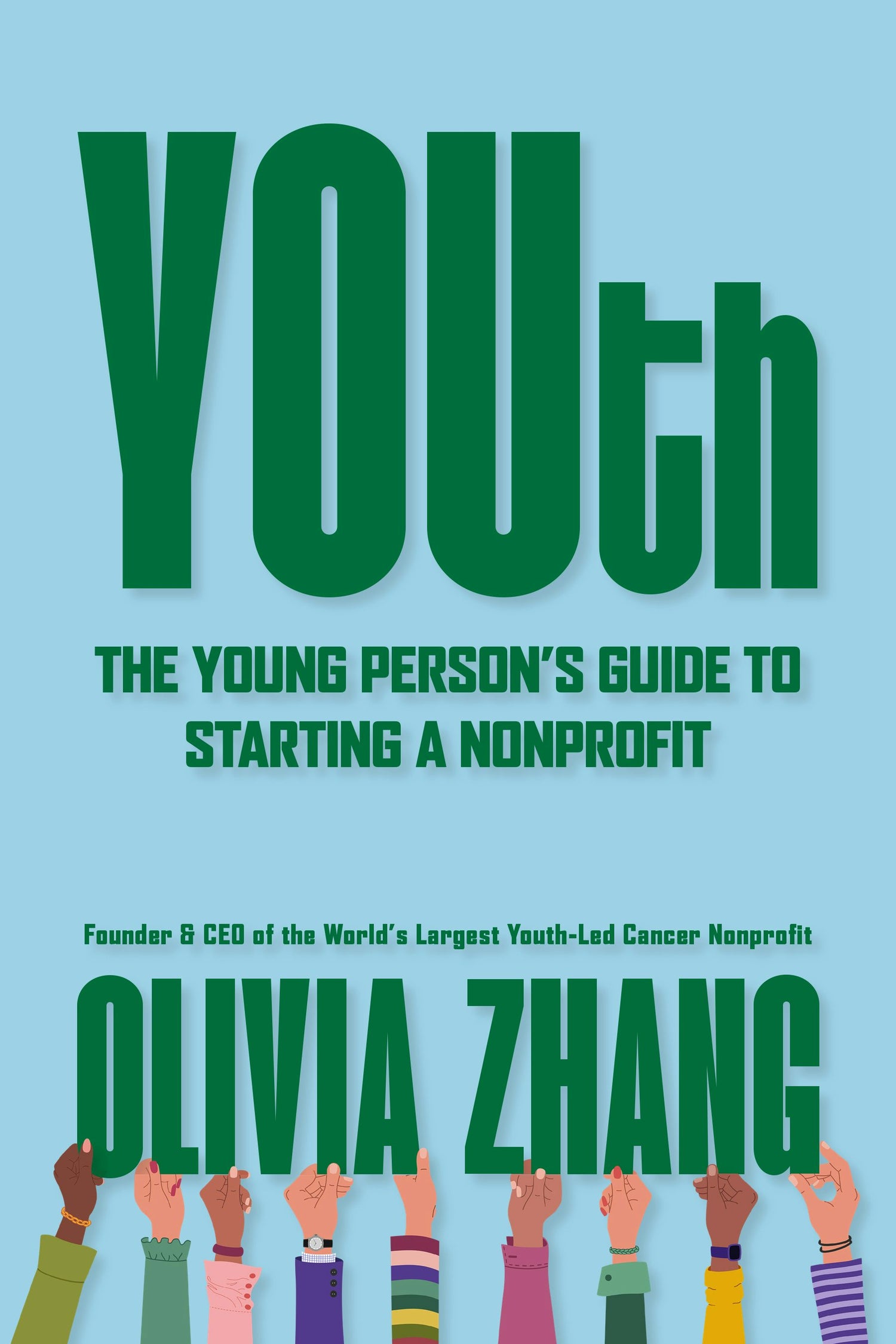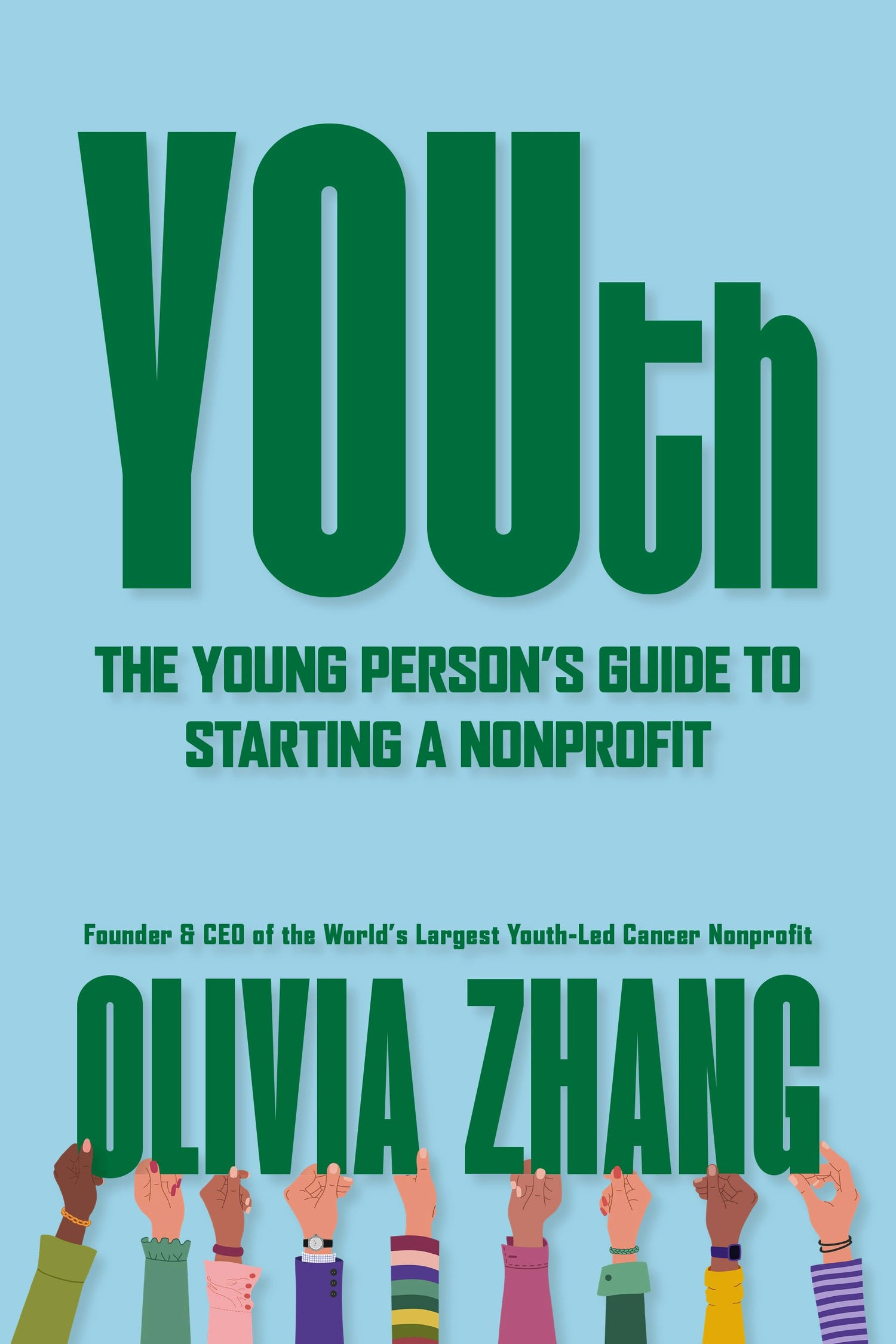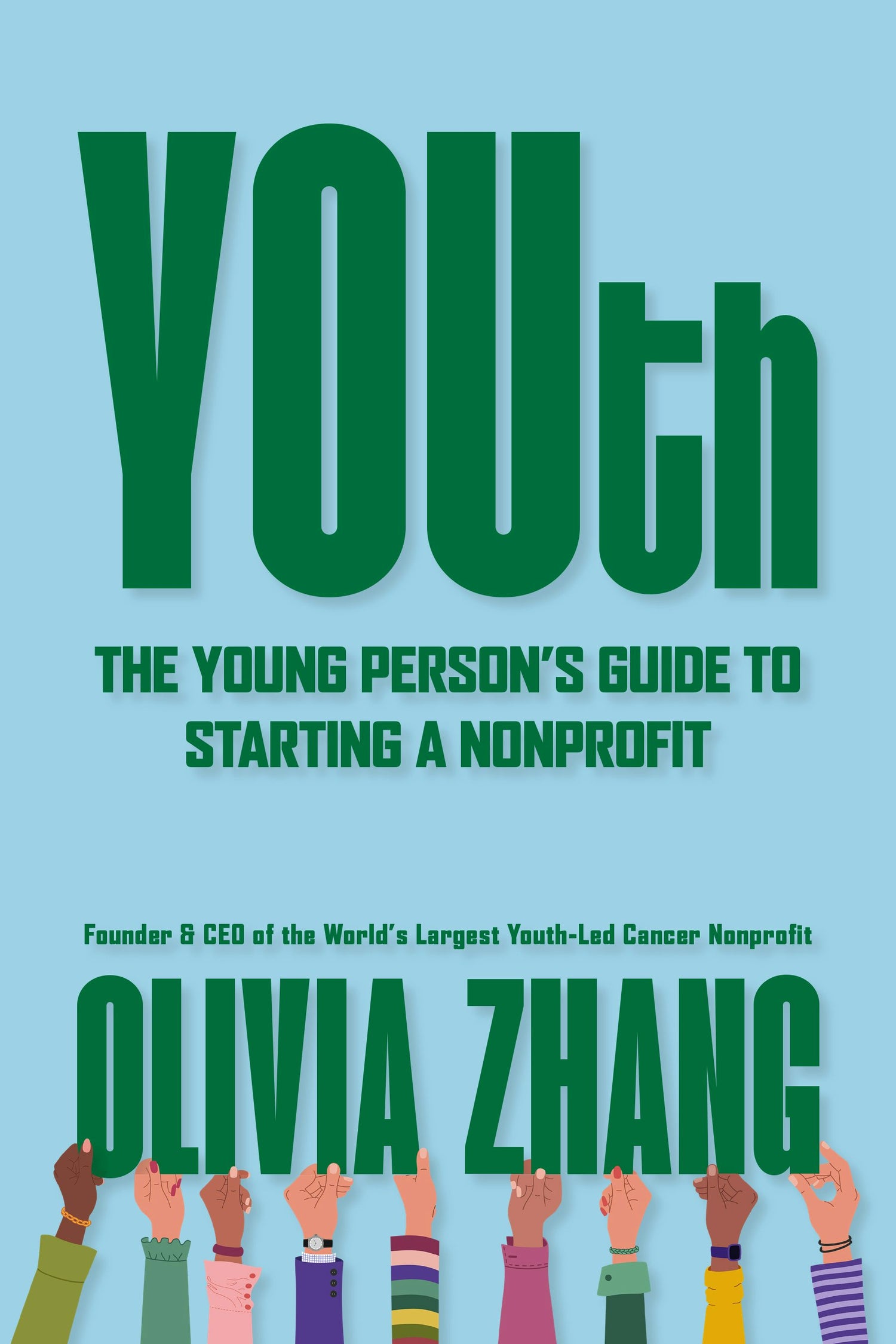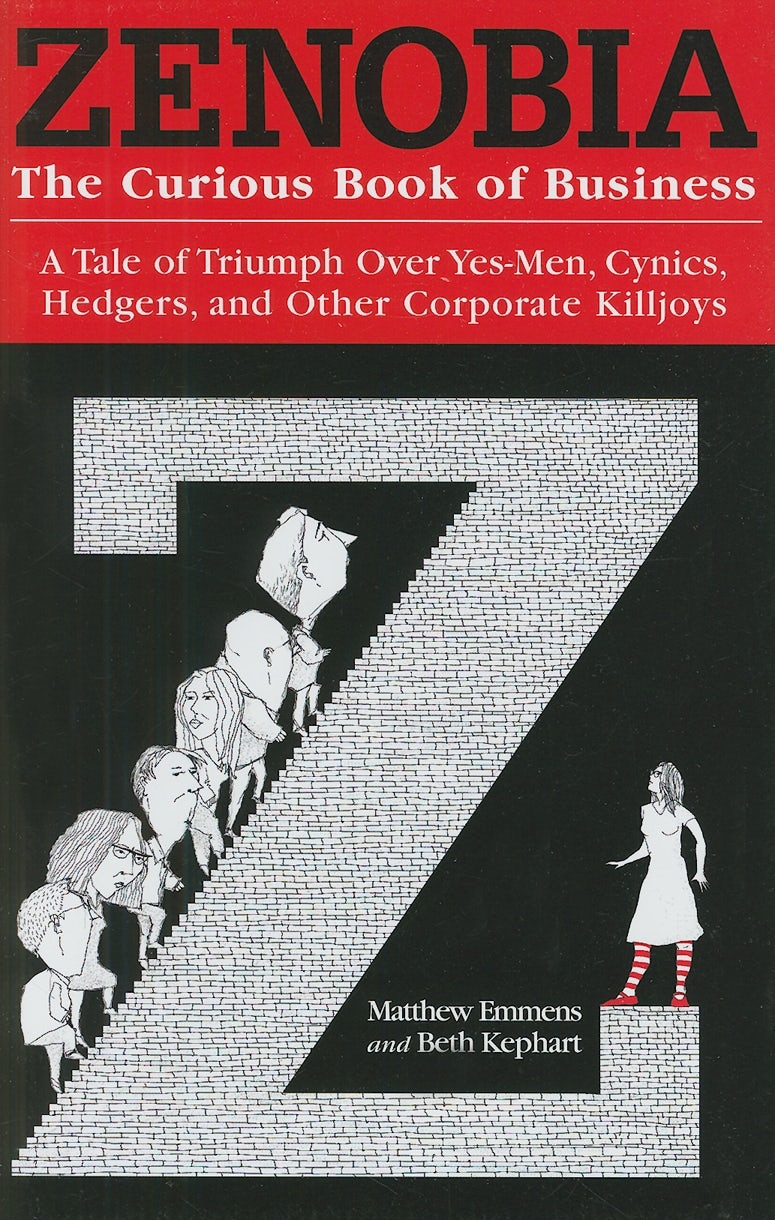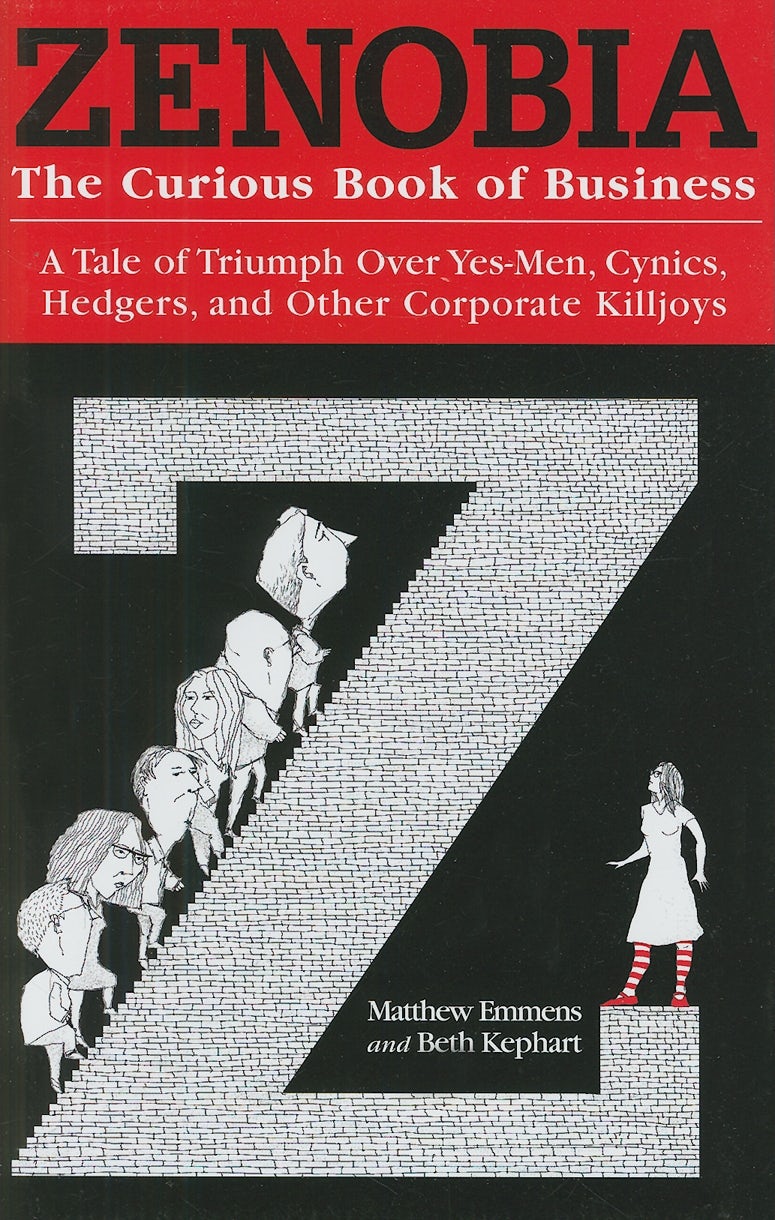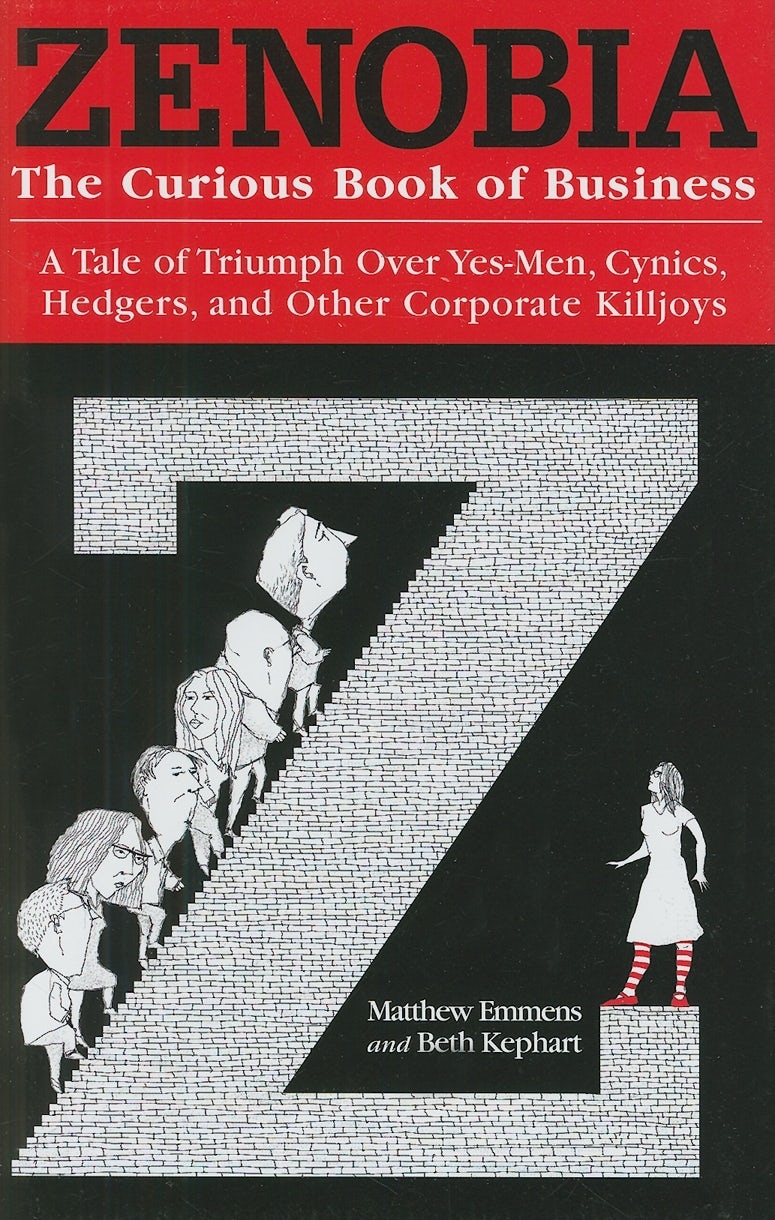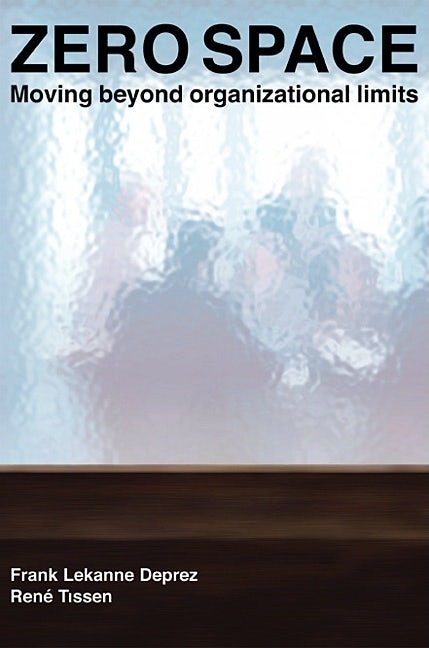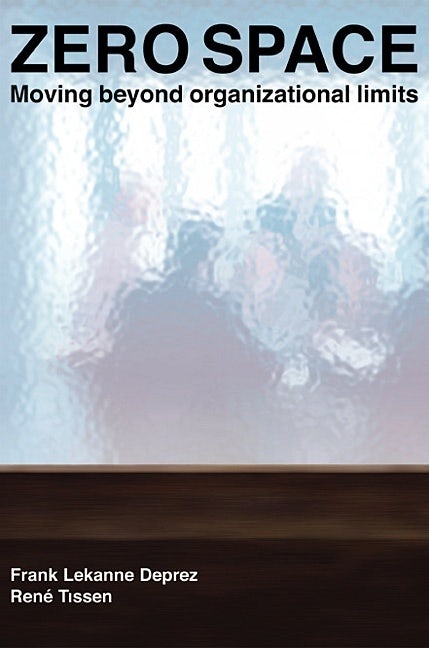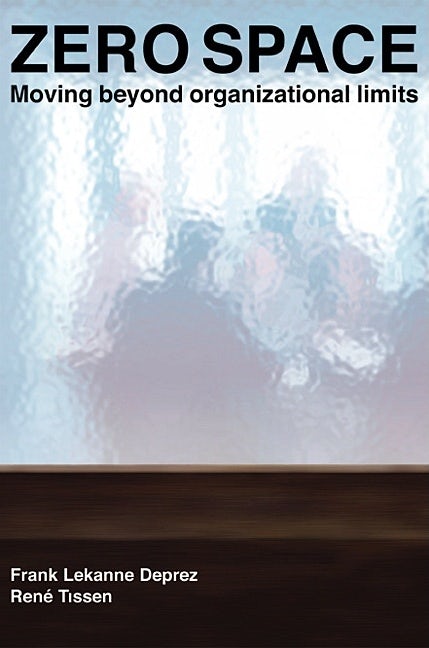Sort by:
This essential guidebook, which shows young changemakers how to build successful nonprofits from scratch, comes from the teenage founder of Cancer Kids First, the world’s largest youth-led cancer nonprofit. It features step-by-step worksheets, checklists, and actionable exercises.
Young people are driving social change like never before, but many passionate activists lack the roadmap to turn their ideas into sustainable organizations. Olivia Zhang, who founded Cancer Kids First at age fourteen after losing two loved ones to cancer, delivers the comprehensive nonprofit guide she wishes she’d had when first starting out.
Now a Harvard student and recipient of the Diana Legacy Award, Zhang shares her journey of growing Cancer Kids First to reach over 10,000 patients across twenty-two countries.
Readers will get from Zhang the following:
Young people are driving social change like never before, but many passionate activists lack the roadmap to turn their ideas into sustainable organizations. Olivia Zhang, who founded Cancer Kids First at age fourteen after losing two loved ones to cancer, delivers the comprehensive nonprofit guide she wishes she’d had when first starting out.
Now a Harvard student and recipient of the Diana Legacy Award, Zhang shares her journey of growing Cancer Kids First to reach over 10,000 patients across twenty-two countries.
Readers will get from Zhang the following:
- Step-by-step instructions on legal filing, branding, team-building, and fundraising
- Practical worksheets, checklists, and actionable exercises
- Gen Z–friendly format with emojis and approachable language
- Proven strategies from Zhang’s journey of scaling Cancer Kids First to twenty-two countries
This essential guidebook, which shows young changemakers how to build successful nonprofits from scratch, comes from the teenage founder of Cancer Kids First, the world’s largest youth-led cancer nonprofit. It features step-by-step worksheets, checklists, and actionable exercises.
Young people are driving social change like never before, but many passionate activists lack the roadmap to turn their ideas into sustainable organizations. Olivia Zhang, who founded Cancer Kids First at age fourteen after losing two loved ones to cancer, delivers the comprehensive nonprofit guide she wishes she’d had when first starting out.
Now a Harvard student and recipient of the Diana Legacy Award, Zhang shares her journey of growing Cancer Kids First to reach over 10,000 patients across twenty-two countries.
Readers will get from Zhang the following:
Young people are driving social change like never before, but many passionate activists lack the roadmap to turn their ideas into sustainable organizations. Olivia Zhang, who founded Cancer Kids First at age fourteen after losing two loved ones to cancer, delivers the comprehensive nonprofit guide she wishes she’d had when first starting out.
Now a Harvard student and recipient of the Diana Legacy Award, Zhang shares her journey of growing Cancer Kids First to reach over 10,000 patients across twenty-two countries.
Readers will get from Zhang the following:
- Step-by-step instructions on legal filing, branding, team-building, and fundraising
- Practical worksheets, checklists, and actionable exercises
- Gen Z–friendly format with emojis and approachable language
- Proven strategies from Zhang’s journey of scaling Cancer Kids First to twenty-two countries
This essential guidebook, which shows young changemakers how to build successful nonprofits from scratch, comes from the teenage founder of Cancer Kids First, the world’s largest youth-led cancer nonprofit. It features step-by-step worksheets, checklists, and actionable exercises.
Young people are driving social change like never before, but many passionate activists lack the roadmap to turn their ideas into sustainable organizations. Olivia Zhang, who founded Cancer Kids First at age fourteen after losing two loved ones to cancer, delivers the comprehensive nonprofit guide she wishes she’d had when first starting out.
Now a Harvard student and recipient of the Diana Legacy Award, Zhang shares her journey of growing Cancer Kids First to reach over 10,000 patients across twenty-two countries.
Readers will get from Zhang the following:
Young people are driving social change like never before, but many passionate activists lack the roadmap to turn their ideas into sustainable organizations. Olivia Zhang, who founded Cancer Kids First at age fourteen after losing two loved ones to cancer, delivers the comprehensive nonprofit guide she wishes she’d had when first starting out.
Now a Harvard student and recipient of the Diana Legacy Award, Zhang shares her journey of growing Cancer Kids First to reach over 10,000 patients across twenty-two countries.
Readers will get from Zhang the following:
- Step-by-step instructions on legal filing, branding, team-building, and fundraising
- Practical worksheets, checklists, and actionable exercises
- Gen Z–friendly format with emojis and approachable language
- Proven strategies from Zhang’s journey of scaling Cancer Kids First to twenty-two countries
Zenobia is a former industry giant bedeviled by paralyzing hierarchies, grossly inadequate communications, and distrust. It is a broken place, a fortress doomed to collapse upon itself.
Enter Moira, a young woman responding to a cryptic help wanted ad that asks her to report to room 133A – but there are no directions, no sign of the room, and nobody seems inclined to help her find it. As she moves through the Zenobian maze, Moira makes some surprising discoveries about the power of teamwork and the qualities that define true leaders. Her story is interwoven with that of a long-time Zenobia employee named Gallagher, who watches and comments as Moira tries to find the ever-elusive room 133A.
Zenobia reminds us that imagination is one of the most powerful, and most overlooked, elements of business success. Like Moira, those who succeed see what is not yet there, keep faith in their vision, take risks to achieve it, and inspire others to join them. This unusual book will move readers to take a fresh and fearless look at their own organizations and to remember that leadership is not determined by title or position. Rather, as the want ad Moira answers puts it, “Creative persistence a prerequisite. A desire for the extraordinary an absolute must.”
Enter Moira, a young woman responding to a cryptic help wanted ad that asks her to report to room 133A – but there are no directions, no sign of the room, and nobody seems inclined to help her find it. As she moves through the Zenobian maze, Moira makes some surprising discoveries about the power of teamwork and the qualities that define true leaders. Her story is interwoven with that of a long-time Zenobia employee named Gallagher, who watches and comments as Moira tries to find the ever-elusive room 133A.
Zenobia reminds us that imagination is one of the most powerful, and most overlooked, elements of business success. Like Moira, those who succeed see what is not yet there, keep faith in their vision, take risks to achieve it, and inspire others to join them. This unusual book will move readers to take a fresh and fearless look at their own organizations and to remember that leadership is not determined by title or position. Rather, as the want ad Moira answers puts it, “Creative persistence a prerequisite. A desire for the extraordinary an absolute must.”
Zenobia is a former industry giant bedeviled by paralyzing hierarchies, grossly inadequate communications, and distrust. It is a broken place, a fortress doomed to collapse upon itself.
Enter Moira, a young woman responding to a cryptic help wanted ad that asks her to report to room 133A – but there are no directions, no sign of the room, and nobody seems inclined to help her find it. As she moves through the Zenobian maze, Moira makes some surprising discoveries about the power of teamwork and the qualities that define true leaders. Her story is interwoven with that of a long-time Zenobia employee named Gallagher, who watches and comments as Moira tries to find the ever-elusive room 133A.
Zenobia reminds us that imagination is one of the most powerful, and most overlooked, elements of business success. Like Moira, those who succeed see what is not yet there, keep faith in their vision, take risks to achieve it, and inspire others to join them. This unusual book will move readers to take a fresh and fearless look at their own organizations and to remember that leadership is not determined by title or position. Rather, as the want ad Moira answers puts it, “Creative persistence a prerequisite. A desire for the extraordinary an absolute must.”
Part Alice in Wonderland and part business fable, this creatively illustrated work about the adventures of a new hire's introduction to the fantastical company of Zenobia (and its elusive Room 133A) helps business leaders and entrepreneurs find energy in risk, opportunity in the unknown, and possibility in the people all around them-to believe in something that is not yet there.
What would happen if you could achieve business success without owning any assets, but could simply enjoy the benefits of them? What if companies were able to react instantly to changing circumstances by operating in negative time? What if you didn't need management to run your business?
Zero Space defines a business model in which an organization achieves success without owning assets or needing management. In a zero space organization, knowledge is the only true currency and people are the business's assets and its investors in future success.
Through eight new organizational principles the authors illustrate how "zero-mindedness" is essential for the new economy. Just as organizations will have to exist in less tangible, less prescribed forms, so will thinking have to become less departmentalized, less closely guarded. This new open-mindedness or "zero mind-set" targets knowledge so that an organization applies it when and where it is really needed.
The authors-two top executives at one of the "big five" accounting and consulting firms-show how to create a zero-space organization: a value-adding, quick-reacting, non-centralized, non-standardized, innovation-generating workplace for dedicated talent.
What would happen if you could achieve business success without owning any assets, but could simply enjoy the benefits of them? What if companies were able to react instantly to changing circumstances by operating in negative time? What if you didn't need management to run your business?
Zero Space defines a business model in which an organization achieves success without owning assets or needing management. In a zero space organization, knowledge is the only true currency and people are the business's assets and its investors in future success.
Through eight new organizational principles the authors illustrate how "zero-mindedness" is essential for the new economy. Just as organizations will have to exist in less tangible, less prescribed forms, so will thinking have to become less departmentalized, less closely guarded. This new open-mindedness or "zero mind-set" targets knowledge so that an organization applies it when and where it is really needed.
The authors-two top executives at one of the "big five" accounting and consulting firms-show how to create a zero-space organization: a value-adding, quick-reacting, non-centralized, non-standardized, innovation-generating workplace for dedicated talent.
Zero Space defines a business model in which an organization achieves success without owning assets or needing management. In a zero space organization, knowledge is the only true currency and people are the business's assets and its investors in future success.
Through eight new organizational principles the authors illustrate how "zero-mindedness" is essential for the new economy. Just as organizations will have to exist in less tangible, less prescribed forms, so will thinking have to become less departmentalized, less closely guarded. This new open-mindedness or "zero mind-set" targets knowledge so that an organization applies it when and where it is really needed.
The authors-two top executives at one of the "big five" accounting and consulting firms-show how to create a zero-space organization: a value-adding, quick-reacting, non-centralized, non-standardized, innovation-generating workplace for dedicated talent.
What would happen if you could achieve business success without owning any assets, but could simply enjoy the benefits of them? What if companies were able to react instantly to changing circumstances by operating in negative time? What if you didn't need management to run your business?
Zero Space defines a business model in which an organization achieves success without owning assets or needing management. In a zero space organization, knowledge is the only true currency and people are the business's assets and its investors in future success.
Through eight new organizational principles the authors illustrate how "zero-mindedness" is essential for the new economy. Just as organizations will have to exist in less tangible, less prescribed forms, so will thinking have to become less departmentalized, less closely guarded. This new open-mindedness or "zero mind-set" targets knowledge so that an organization applies it when and where it is really needed.
The authors-two top executives at one of the "big five" accounting and consulting firms-show how to create a zero-space organization: a value-adding, quick-reacting, non-centralized, non-standardized, innovation-generating workplace for dedicated talent.
Zero Space defines a business model in which an organization achieves success without owning assets or needing management. In a zero space organization, knowledge is the only true currency and people are the business's assets and its investors in future success.
Through eight new organizational principles the authors illustrate how "zero-mindedness" is essential for the new economy. Just as organizations will have to exist in less tangible, less prescribed forms, so will thinking have to become less departmentalized, less closely guarded. This new open-mindedness or "zero mind-set" targets knowledge so that an organization applies it when and where it is really needed.
The authors-two top executives at one of the "big five" accounting and consulting firms-show how to create a zero-space organization: a value-adding, quick-reacting, non-centralized, non-standardized, innovation-generating workplace for dedicated talent.


